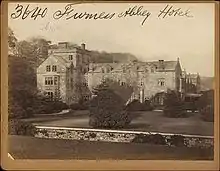Furness Abbey Hotel
The Furness Abbey Hotel, now a public house named The Abbey Tavern, stands in Abbey Approach, Barrow-in-Furness, Cumbria, England, to the north of the remains of Furness Abbey. The current structure is recorded in the National Heritage List for England as a designated Grade II listed building.[1]

History
In the 17th century this was the manor house for the Preston family, and probably incorporated the guest house of Furness Abbey.[2] By the 19th century the Prestons had left the house, and it remained empty until it was purchased by the Furness Railway in 1847.[3] The Lancaster architects Sharpe and Paley converted it into a hotel to accommodate visitors to the abbey. This contained 36 bedrooms and "only" three bathrooms.[4] The public rooms included an entrance hall and a reading and sitting room, both with stained glass windows, a billiard room, and a ballroom.[4] It was extended in 1866–69, probably by E. G. Paley, to link it to the newly built Furness Abbey railway station.[2] In 1953–54 the building was demolished, other than part of the north wing.[5]
Architecture and assessment
The building, as it currently exists, is constructed in red sandstone with slate roofs. It is in two and three storeys. It "represents a fragment of a substantial hotel that served the Furness Railway".[1] The architectural historians Matthew Hyde and Nikolaus Pevsner comment that "it is a pity no more is left of so tantalising a building".[2]
References
- Historic England, "The Abbey Tavern, Barrow-in-Furness (1025255)", National Heritage List for England, retrieved 29 May 2012
- Hyde, Matthew; Pevsner, Nikolaus (2010) [1967], Cumbria, The Buildings of England, New Haven and London: Yale University Press, p. 359, ISBN 978-0-300-12663-1
- Furness Abbey Hotel, Barrow-in-Furness Civic and Local History Society, retrieved 13 August 2011
- Hughes, John M. (2010), Edmund Sharpe: Man of Lancaster, John M. Hughes, pp. 230–231
- Brandwood, Geoff; Austin, Tim; Hughes, John; Price, James (2012), The Architecture of Sharpe, Paley and Austin, Swindon: English Heritage, p. 214, ISBN 978-1-84802-049-8